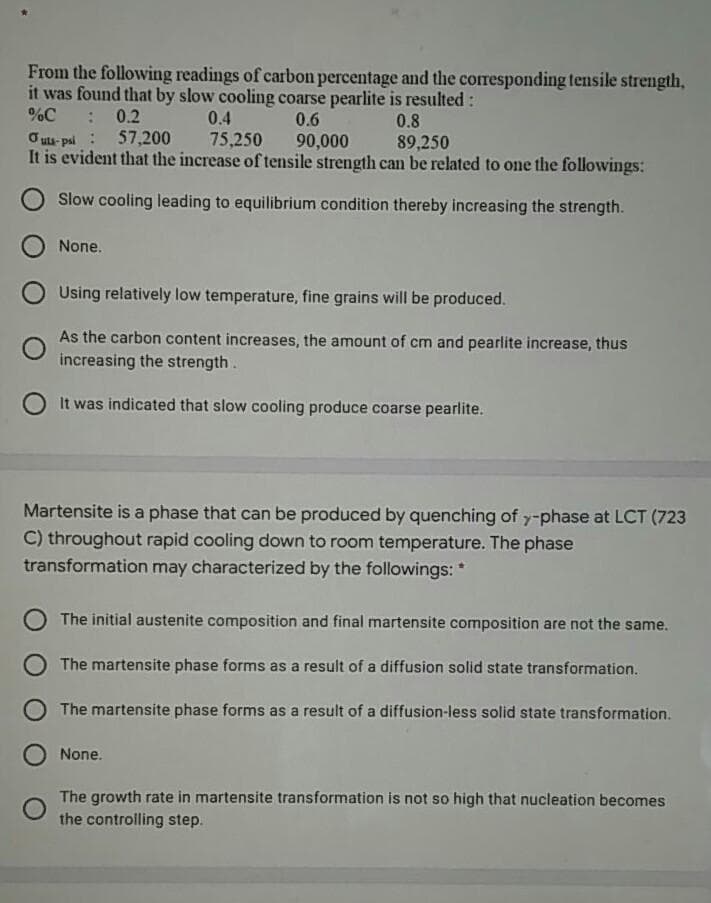From the following readings of carbon percentage and the corresponding tensile strength, it was found that by slow cooling coarse pearlite is resulted : %C 0.2 0.4 75,250 0.6 0.8 89,250 O uta- psi 57,200 90,000 It is evident that the increase of tensile strength can be related to one the followings:
From the following readings of carbon percentage and the corresponding tensile strength, it was found that by slow cooling coarse pearlite is resulted : %C 0.2 0.4 75,250 0.6 0.8 89,250 O uta- psi 57,200 90,000 It is evident that the increase of tensile strength can be related to one the followings:
Elements Of Electromagnetics
7th Edition
ISBN:9780190698614
Author:Sadiku, Matthew N. O.
Publisher:Sadiku, Matthew N. O.
ChapterMA: Math Assessment
Section: Chapter Questions
Problem 1.1MA
Related questions
Question
Material science

Transcribed Image Text:From the following readings of carbon percentage and the corresponding tensile strength,
it was found that by slow cooling coarse pearlite is resulted:
%C
0.2
57,200
0.4
0.6
0.8
89,250
O uta- psi :
It is evident that the increase of tensile strength can be related to one the followings:
75,250
90,000
Slow cooling leading to equilibrium condition thereby increasing the strength.
None.
O Using relatively low temperature, fine grains will be produced.
As the carbon content increases, the amount of cm and pearlite increase, thus
increasing the strength.
O It was indicated that slow cooling produce coarse pearlite.
Martensite is a phase that can be produced by quenching of y-phase at LCT (723
C) throughout rapid cooling down to room temperature. The phase
transformation may characterized by the followings: *
O The initial austenite composition and final martensite composition are not the same.
O The martensite phase forms as a result of a diffusion solid state transformation.
O The martensite phase forms as a result of a diffusion-less solid state transformation.
None.
The growth rate in martensite transformation is not so high that nucleation becomes
the controlling step.
Expert Solution
This question has been solved!
Explore an expertly crafted, step-by-step solution for a thorough understanding of key concepts.
Step by step
Solved in 2 steps with 2 images

Knowledge Booster
Learn more about
Need a deep-dive on the concept behind this application? Look no further. Learn more about this topic, mechanical-engineering and related others by exploring similar questions and additional content below.Recommended textbooks for you

Elements Of Electromagnetics
Mechanical Engineering
ISBN:
9780190698614
Author:
Sadiku, Matthew N. O.
Publisher:
Oxford University Press

Mechanics of Materials (10th Edition)
Mechanical Engineering
ISBN:
9780134319650
Author:
Russell C. Hibbeler
Publisher:
PEARSON

Thermodynamics: An Engineering Approach
Mechanical Engineering
ISBN:
9781259822674
Author:
Yunus A. Cengel Dr., Michael A. Boles
Publisher:
McGraw-Hill Education

Elements Of Electromagnetics
Mechanical Engineering
ISBN:
9780190698614
Author:
Sadiku, Matthew N. O.
Publisher:
Oxford University Press

Mechanics of Materials (10th Edition)
Mechanical Engineering
ISBN:
9780134319650
Author:
Russell C. Hibbeler
Publisher:
PEARSON

Thermodynamics: An Engineering Approach
Mechanical Engineering
ISBN:
9781259822674
Author:
Yunus A. Cengel Dr., Michael A. Boles
Publisher:
McGraw-Hill Education

Control Systems Engineering
Mechanical Engineering
ISBN:
9781118170519
Author:
Norman S. Nise
Publisher:
WILEY

Mechanics of Materials (MindTap Course List)
Mechanical Engineering
ISBN:
9781337093347
Author:
Barry J. Goodno, James M. Gere
Publisher:
Cengage Learning

Engineering Mechanics: Statics
Mechanical Engineering
ISBN:
9781118807330
Author:
James L. Meriam, L. G. Kraige, J. N. Bolton
Publisher:
WILEY